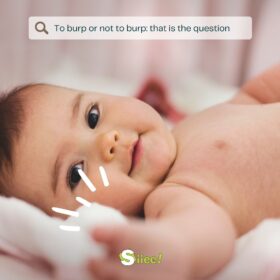Blog
Should you really make your baby burp after meals?
 Baby Burp for New Parents
Baby Burp for New Parents
In the world of parenting, burping newborns post-feeding is both a common and widely advised practice. Yet, a question emerges: is it essential?
This article tries to go into the nuances of burping, why babies cry or regurgitate after meals, and offer a myth busting view about it.
Why Do Parents Burp Their Babies?
Newborn parents are often told that burping helps to alleviate discomfort and prevent the regurgitation of milk after feeding. It is a common practice and it is rooted in the belief that like adults, babies swallow air while eating, which can be released through burping.
Theoretically it reduces crying, baby discomfort and the spitting up of milk post-feeding.
Is Baby Burp REALLY Always Necessary?
Contrary to popular belief, not all post-feeding discomforts are due to air trapped in the stomach.
Babies cry for a variety of reasons including, but not limited to: hunger, discomfort, or even colic, which is crying with no discernible cause.
Moreover, “spitting up” is common among newborns due to an immature digestive system and usually resolves itself as the baby grows.
 Research Insights and Recent Discoveries on Baby Burping
Research Insights and Recent Discoveries on Baby Burping
Interestingly, limited research do not support the necessity of burping!
A study in India observed two groups of newborns: one was burped post-feeding, and the other was not.
The findings revealed that burping did not significantly reduce crying and actually increased the frequency of spitting up.
This questions the traditional view and suggests that burping might not be as beneficial as once thought.
When Should You Be Concerned?
While occasional crying and spitting up are normal, certain symptoms should prompt concern among parents, such as refusal to feed, significant vomiting issues, or signs of big distress during feeding. In such cases, consulting a healthcare professional is the next best step.
Cultural Perspectives on Burping
Globally, the practice of burping varies.
A clear example is a research from Indonesia that shows that many breastfeeding mothers rarely burp their babies post-feeding. Such cultural differences highlight that burping is not as universally regarded as one thought it is and that parenting practices can vary significantly across regions.
The Role of Baby Carriers and Slings
Carrying babies in slings or carriers can naturally help reduce the time they spend crying. This position allows any swallowed air to escape more easily, potentially reducing the need for burping. Furthermore, using slings has been linked to benefits for the mother as well, including lower rates of post-natal depression and prolonged breastfeeding durations.
Making an Informed Decision
Ultimately, whether to burp your baby is a personal choice. If burping seems to comfort your baby and fits well into your routine, it may be worth continuing. However, if it causes stress for either of you, it might be beneficial to try alternatives like using a baby sling for comfort and to reduce crying.
Final take on this: To Burp or Not to Burp? – William Babyspeare
As parents navigate their unique journey with their newborn, understanding the full scope of options available, including the efficacy and necessity of burping, can empower them to make the best choices for their child’s comfort and development. The bottom line is each baby is different, and what works for one may not work for another.
For more insights and tips on newborn care, visit Siiee!
If you enjoyed this content please consider buying something for you baby from us.
Our online store offers a variety of baby items that cater to every need.
Please check it here:
https://www.siiee.com/product-category/baby-and-kids/
This article is also available in Portuguese and Spanish—simply click on the language selector.








 Research Insights and Recent Discoveries on Baby Burping
Research Insights and Recent Discoveries on Baby Burping